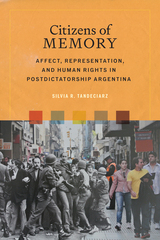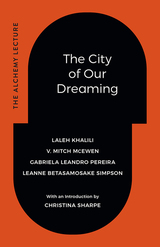5 books about Hedges, Larry V.
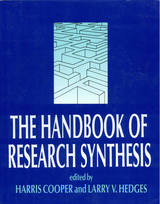
The Handbook of Research Synthesis
Harris Cooper
Russell Sage Foundation, 1994
"The Handbook is a comprehensive treatment of literature synthesis and provides practical advice for anyone deep in the throes of, just teetering on the brink of, or attempting to decipher a meta-analysis. Given the expanding application and importance of literature synthesis, understanding both its strengths and weaknesses is essential for its practitioners and consumers. This volume is a good beginning for those who wish to gain that understanding." —Chance "Meta-analysis, as the statistical analysis of a large collection of results from individual studies is called, has now achieved a status of respectability in medicine. This respectability, when combined with the slight hint of mystique that sometimes surrounds meta-analysis, ensures that results of studies that use it are treated with the respect they deserve….The Handbook of Research Synthesis is one of the most important publications in this subject both as a definitive reference book and a practical manual."—British Medical Journal The Handbook of Research Synthesis is the definitive reference and how-to manual for behavioral and medical scientists applying the craft of research synthesis. It draws upon twenty years of ground-breaking advances that have transformed the practice of synthesizing research literature from an art into a scientific process in its own right. Editors Harris Cooper and Larry V. Hedges have brought together leading authorities to guide the reader through every stage of the research synthesis process—problem formulation, literature search and evaluation, statistical integration, and report preparation. The Handbook of Research Synthesis incorporates in a single volume state-of-the-art techniques from all quantitative synthesis traditions, including Bayesian inference and the meta-analytic approaches. Distilling a vast technical literature and many informal sources, the Handbook provides a portfolio of the most effective solutions to problems of quantitative data integration. The Handbook of Research Synthesis also provides a rich treatment of the non-statistical aspects of research synthesis. Topics include searching the literature, managing reference databases and registries, and developing coding schemes. Those engaged in research synthesis will also find useful advice on how tables, graphs, and narration can be deployed to provide the most meaningful communication of the results of research synthesis. The Handbook of Research Synthesis is an illuminating compilation of practical instruction, theory, and problem solving. It provides an accumulation of knowledge about the craft of reviewing a scientific literature that can be found in no other single source. The Handbook offers the reader thorough instruction in the skills necessary to conduct powerful research syntheses meeting the highest standards of objectivity, systematicity, and rigor demanded of scientific enquiry. This definitive work will represent the state of the art in research synthesis for years to come.
[more]
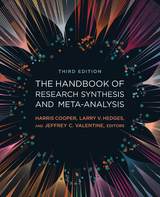
The Handbook of Research Synthesis and Meta-Analysis
Harris Cooper
Russell Sage Foundation, 2019
Research synthesis is the practice of systematically distilling and integrating data from many studies in order to draw more reliable conclusions about a given research issue. When the first edition of The Handbook of Research Synthesis and Meta-Analysis was published in 1994, it quickly became the definitive reference for conducting meta-analyses in both the social and behavioral sciences. In the third edition, editors Harris Cooper, Larry Hedges, and Jeff Valentine present updated versions of classic chapters and add new sections that evaluate cutting-edge developments in the field.
The Handbook of Research Synthesis and Meta-Analysis draws upon groundbreaking advances that have transformed research synthesis from a narrative craft into an important scientific process in its own right. The editors and leading scholars guide the reader through every stage of the research synthesis process—problem formulation, literature search and evaluation, statistical integration, and report preparation. The Handbook incorporates state-of-the-art techniques from all quantitative synthesis traditions and distills a vast literature to explain the most effective solutions to the problems of quantitative data integration. Among the statistical issues addressed are the synthesis of non-independent data sets, fixed and random effects methods, the performance of sensitivity analyses and model assessments, the development of machine-based abstract screening, the increased use of meta-regression and the problems of missing data. The Handbook also addresses the non-statistical aspects of research synthesis, including searching the literature and developing schemes for gathering information from study reports. Those engaged in research synthesis will find useful advice on how tables, graphs, and narration can foster communication of the results of research syntheses.
The third edition of the Handbook provides comprehensive instruction in the skills necessary to conduct research syntheses and represents the premier text on research synthesis.
Praise for the first edition: "The Handbook is a comprehensive treatment of literature synthesis and provides practical advice for anyone deep in the throes of, just teetering on the brink of, or attempting to decipher a meta-analysis. Given the expanding application and importance of literature synthesis, understanding both its strengths and weaknesses is essential for its practitioners and consumers. This volume is a good beginning for those who wish to gain that understanding." —Chance "Meta-analysis, as the statistical analysis of a large collection of results from individual studies is called, has now achieved a status of respectability in medicine. This respectability, when combined with the slight hint of mystique that sometimes surrounds meta-analysis, ensures that results of studies that use it are treated with the respect they deserve….The Handbook of Research Synthesis is one of the most important publications in this subject both as a definitive reference book and a practical manual."—British Medical Journal When the first edition of The Handbook of Research Synthesis was published in 1994, it quickly became the definitive reference for researchers conducting meta-analyses of existing research in both the social and biological sciences. In this fully revised second edition, editors Harris Cooper, Larry Hedges, and Jeff Valentine present updated versions of the Handbook's classic chapters, as well as entirely new sections reporting on the most recent, cutting-edge developments in the field. Research synthesis is the practice of systematically distilling and integrating data from a variety of sources in order to draw more reliable conclusions about a given question or topic. The Handbook of Research Synthesis and Meta-Analysis draws upon years of groundbreaking advances that have transformed research synthesis from a narrative craft into an important scientific process in its own right. Cooper, Hedges, and Valentine have assembled leading authorities in the field to guide the reader through every stage of the research synthesis process—problem formulation, literature search and evaluation, statistical integration, and report preparation. The Handbook of Research Synthesis and Meta-Analysis incorporates state-of-the-art techniques from all quantitative synthesis traditions. Distilling a vast technical literature and many informal sources, the Handbook provides a portfolio of the most effective solutions to the problems of quantitative data integration. Among the statistical issues addressed by the authors are the synthesis of non-independent data sets, fixed and random effects methods, the performance of sensitivity analyses and model assessments, and the problem of missing data. The Handbook of Research Synthesis and Meta-Analysis also provides a rich treatment of the non-statistical aspects of research synthesis. Topics include searching the literature, and developing schemes for gathering information from study reports. Those engaged in research synthesis will also find useful advice on how tables, graphs, and narration can be used to provide the most meaningful communication of the results of research synthesis. In addition, the editors address the potentials and limitations of research synthesis, and its future directions. The past decade has been a period of enormous growth in the field of research synthesis. The second edition Handbook thoroughly revises original chapters to assure that the volume remains the most authoritative source of information for researchers undertaking meta-analysis today. In response to the increasing use of research synthesis in the formation of public policy, the second edition includes a new chapter on both the strengths and limitations of research synthesis in policy debates
The Handbook of Research Synthesis and Meta-Analysis draws upon groundbreaking advances that have transformed research synthesis from a narrative craft into an important scientific process in its own right. The editors and leading scholars guide the reader through every stage of the research synthesis process—problem formulation, literature search and evaluation, statistical integration, and report preparation. The Handbook incorporates state-of-the-art techniques from all quantitative synthesis traditions and distills a vast literature to explain the most effective solutions to the problems of quantitative data integration. Among the statistical issues addressed are the synthesis of non-independent data sets, fixed and random effects methods, the performance of sensitivity analyses and model assessments, the development of machine-based abstract screening, the increased use of meta-regression and the problems of missing data. The Handbook also addresses the non-statistical aspects of research synthesis, including searching the literature and developing schemes for gathering information from study reports. Those engaged in research synthesis will find useful advice on how tables, graphs, and narration can foster communication of the results of research syntheses.
The third edition of the Handbook provides comprehensive instruction in the skills necessary to conduct research syntheses and represents the premier text on research synthesis.
Praise for the first edition: "The Handbook is a comprehensive treatment of literature synthesis and provides practical advice for anyone deep in the throes of, just teetering on the brink of, or attempting to decipher a meta-analysis. Given the expanding application and importance of literature synthesis, understanding both its strengths and weaknesses is essential for its practitioners and consumers. This volume is a good beginning for those who wish to gain that understanding." —Chance "Meta-analysis, as the statistical analysis of a large collection of results from individual studies is called, has now achieved a status of respectability in medicine. This respectability, when combined with the slight hint of mystique that sometimes surrounds meta-analysis, ensures that results of studies that use it are treated with the respect they deserve….The Handbook of Research Synthesis is one of the most important publications in this subject both as a definitive reference book and a practical manual."—British Medical Journal When the first edition of The Handbook of Research Synthesis was published in 1994, it quickly became the definitive reference for researchers conducting meta-analyses of existing research in both the social and biological sciences. In this fully revised second edition, editors Harris Cooper, Larry Hedges, and Jeff Valentine present updated versions of the Handbook's classic chapters, as well as entirely new sections reporting on the most recent, cutting-edge developments in the field. Research synthesis is the practice of systematically distilling and integrating data from a variety of sources in order to draw more reliable conclusions about a given question or topic. The Handbook of Research Synthesis and Meta-Analysis draws upon years of groundbreaking advances that have transformed research synthesis from a narrative craft into an important scientific process in its own right. Cooper, Hedges, and Valentine have assembled leading authorities in the field to guide the reader through every stage of the research synthesis process—problem formulation, literature search and evaluation, statistical integration, and report preparation. The Handbook of Research Synthesis and Meta-Analysis incorporates state-of-the-art techniques from all quantitative synthesis traditions. Distilling a vast technical literature and many informal sources, the Handbook provides a portfolio of the most effective solutions to the problems of quantitative data integration. Among the statistical issues addressed by the authors are the synthesis of non-independent data sets, fixed and random effects methods, the performance of sensitivity analyses and model assessments, and the problem of missing data. The Handbook of Research Synthesis and Meta-Analysis also provides a rich treatment of the non-statistical aspects of research synthesis. Topics include searching the literature, and developing schemes for gathering information from study reports. Those engaged in research synthesis will also find useful advice on how tables, graphs, and narration can be used to provide the most meaningful communication of the results of research synthesis. In addition, the editors address the potentials and limitations of research synthesis, and its future directions. The past decade has been a period of enormous growth in the field of research synthesis. The second edition Handbook thoroughly revises original chapters to assure that the volume remains the most authoritative source of information for researchers undertaking meta-analysis today. In response to the increasing use of research synthesis in the formation of public policy, the second edition includes a new chapter on both the strengths and limitations of research synthesis in policy debates
[more]
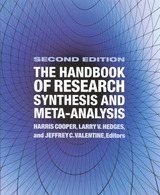
The Handbook of Research Synthesis and Meta-Analysis
Harris Cooper
Russell Sage Foundation, 2009
Praise for the first edition: "The Handbook is a comprehensive treatment of literature synthesis and provides practical advice for anyone deep in the throes of, just teetering on the brink of, or attempting to decipher a meta-analysis. Given the expanding application and importance of literature synthesis, understanding both its strengths and weaknesses is essential for its practitioners and consumers. This volume is a good beginning for those who wish to gain that understanding." —Chance "Meta-analysis, as the statistical analysis of a large collection of results from individual studies is called, has now achieved a status of respectability in medicine. This respectability, when combined with the slight hint of mystique that sometimes surrounds meta-analysis, ensures that results of studies that use it are treated with the respect they deserve….The Handbook of Research Synthesis is one of the most important publications in this subject both as a definitive reference book and a practical manual."—British Medical Journal When the first edition of The Handbook of Research Synthesis was published in 1994, it quickly became the definitive reference for researchers conducting meta-analyses of existing research in both the social and biological sciences. In this fully revised second edition, editors Harris Cooper, Larry Hedges, and Jeff Valentine present updated versions of the Handbook's classic chapters, as well as entirely new sections reporting on the most recent, cutting-edge developments in the field. Research synthesis is the practice of systematically distilling and integrating data from a variety of sources in order to draw more reliable conclusions about a given question or topic. The Handbook of Research Synthesis and Meta-Analysis draws upon years of groundbreaking advances that have transformed research synthesis from a narrative craft into an important scientific process in its own right. Cooper, Hedges, and Valentine have assembled leading authorities in the field to guide the reader through every stage of the research synthesis process—problem formulation, literature search and evaluation, statistical integration, and report preparation. The Handbook of Research Synthesis and Meta-Analysis incorporates state-of-the-art techniques from all quantitative synthesis traditions. Distilling a vast technical literature and many informal sources, the Handbook provides a portfolio of the most effective solutions to the problems of quantitative data integration. Among the statistical issues addressed by the authors are the synthesis of non-independent data sets, fixed and random effects methods, the performance of sensitivity analyses and model assessments, and the problem of missing data. The Handbook of Research Synthesis and Meta-Analysis also provides a rich treatment of the non-statistical aspects of research synthesis. Topics include searching the literature, and developing schemes for gathering information from study reports. Those engaged in research synthesis will also find useful advice on how tables, graphs, and narration can be used to provide the most meaningful communication of the results of research synthesis. In addition, the editors address the potentials and limitations of research synthesis, and its future directions. The past decade has been a period of enormous growth in the field of research synthesis. The second edition Handbook thoroughly revises original chapters to assure that the volume remains the most authoritative source of information for researchers undertaking meta-analysis today. In response to the increasing use of research synthesis in the formation of public policy, the second edition includes a new chapter on both the strengths and limitations of research synthesis in policy debates
[more]
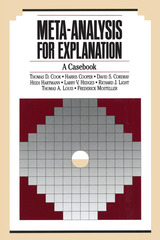
Meta-Analysis for Explanation
A Casebook
Thomas D. Cook
Russell Sage Foundation, 1992
Social science research often yields conflicting results: Does juvenile delinquent rehabilitation work? Is teenage pregnancy prevention effective? In an effort to improve the value of research for shaping social policy, social scientists are increasingly employing a powerful technique called meta-analysis. By systematically pulling together findings of a particular research problem, meta-analysis allows researchers to synthesize the results of multiple studies and detect statistically significant patterns among them. Meta-Analysis for Explanation brings exemplary illustrations of research synthesis together with expert discussion of the use of meta-analytic techniques. The emphasis throughout is on the explanatory applications of meta-analysis, a quality that makes this casebook distinct from other treatments of this methodology. The book features four detailed case studies by Betsy Jane Becker, Elizabeth C. Devine, Mark W. Lipsey, and William R. Shadish, Jr. These are offered as meta-analyses that seek both to answer the descriptive questions to which research synthesis is traditionally directed in the health and social sciences, and also to explore how a more systematic method of explanation might enhance the policy yield of research reviews. To accompany these cases, a group of the field's leading scholars has written several more general chapters that discuss the history of research synthesis, the use of meta-analysis and its value for scientific explanation, and the practical issues and challenges facing researchers who want to try this new technique. As a practical resource, Meta-Analysis for Explanation guides social scientists to greater levels of sophistication in their efforts to synthesize the results of social research. "This is an important book...[it is] another step in the continuing exploration of the wider implications and powers of meta-analytic methods." —Contemporary Psychology
[more]
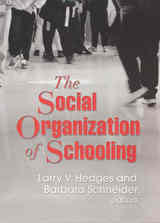
The Social Organization of Schooling
Larry V. Hedges
Russell Sage Foundation, 2005
Schools are complex social settings where students, teachers, administrators, and parents interact to shape a child's educational experience. Any effort to improve educational outcomes for America's children requires a dynamic understanding of the environments in which children learn. In The Social Organization of Schooling, editors Larry Hedges and Barbara Schneider assemble researchers from the fields of education, organizational theory, and sociology to provide a new framework for understanding and analyzing America's schools and the many challenges they face. The Social Organization of Schooling closely examines the varied components that make up a school's social environment. Contributors Adam Gamoran, Ramona Gunter, and Tona Williams focus on the social organization of teaching. Using intensive case studies, they show how positive professional relations among teachers contribute to greater collaboration, the dissemination of effective teaching practices, and ultimately, a better learning environment for children. Children learn more from better teachers, but those best equipped to teach often opt for professions with higher social stature, such as law or medicine. In his chapter, Robert Dreeben calls for the establishment of universal principles and practices to define good teaching, arguing that such standards are necessary to legitimize teaching as a high status profession. The Social Organization of Schooling also looks at how social norms in schools are shaped and reinforced by interactions among teachers and students. Sociologist Maureen Hallinan shows that students who are challenged intellectually and accepted socially are more likely to embrace school norms and accept responsibility for their own actions. Using classroom observations, surveys, and school records, Daniel McFarland finds that group-based classroom activities are effective tools in promoting both social and scholastic development in adolescents. The Social Organization of Schooling also addresses educational reforms and the way they affect a school's social structures. Examining how testing policies affect children's opportunities to learn, Chandra Muller and Kathryn Schiller find that policies which increased school accountability boosted student enrollment in math courses, reflecting a shift in the school culture towards higher standards. Employing a variety of analytical methods, The Social Organization of Schooling provides a sound understanding of the social mechanisms at work in our educational system. This important volume brings a fresh perspective to the many ongoing debates in education policy and is essential reading for anyone concerned with the future of America's children.
[more]
READERS
Browse our collection.
PUBLISHERS
See BiblioVault's publisher services.
STUDENT SERVICES
Files for college accessibility offices.
UChicago Accessibility Resources
home | accessibility | search | about | contact us
BiblioVault ® 2001 - 2025
The University of Chicago Press



